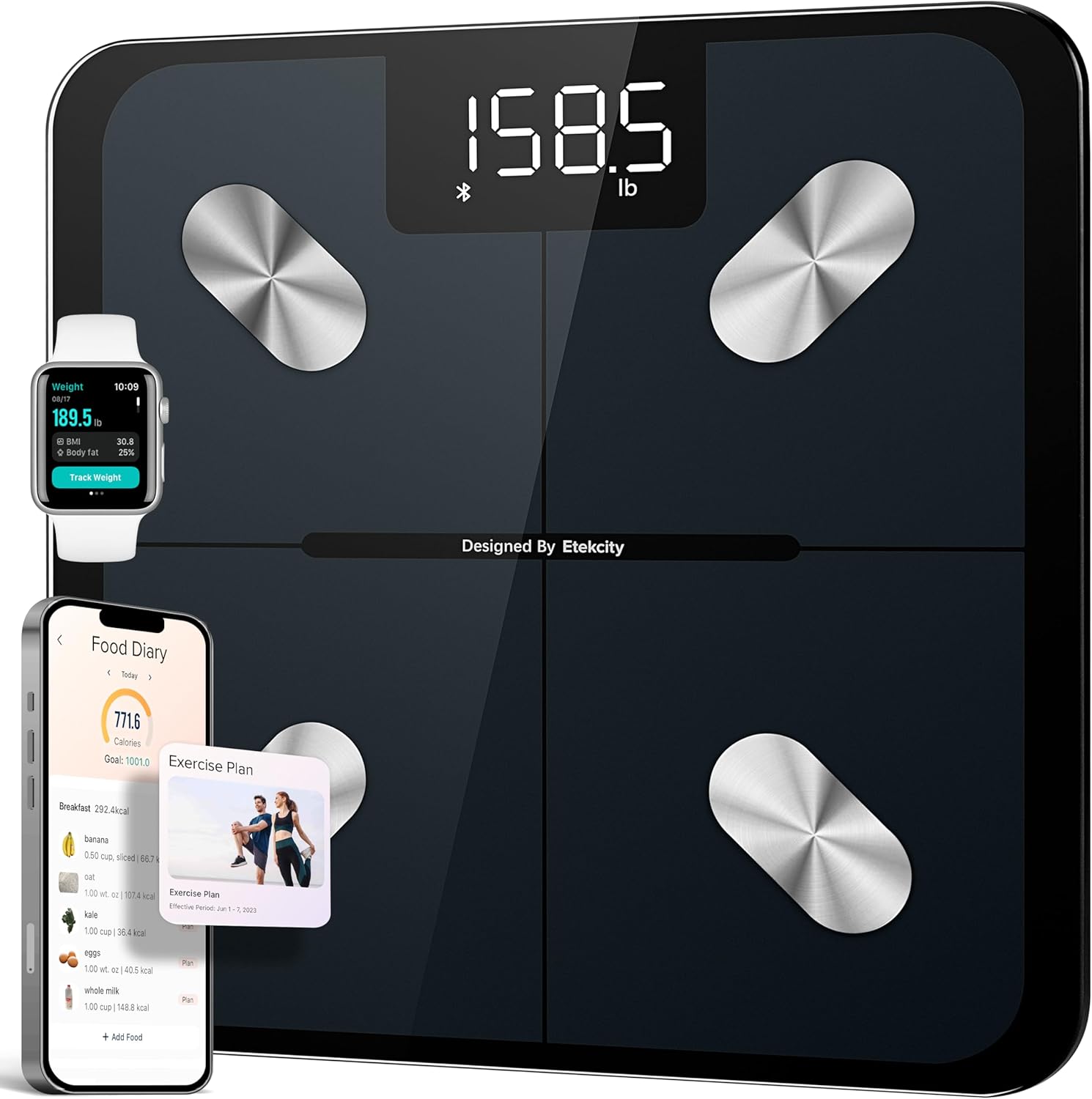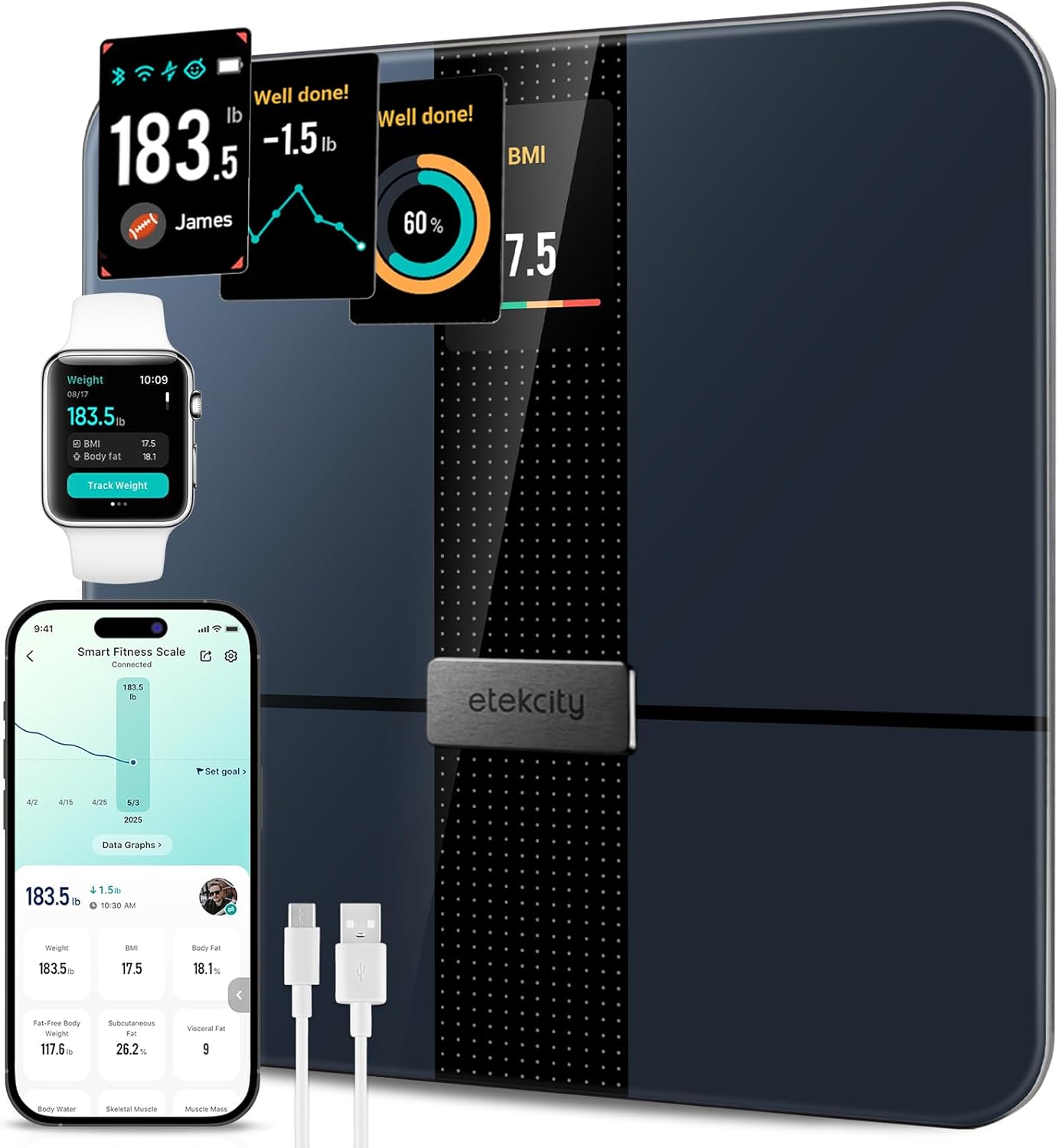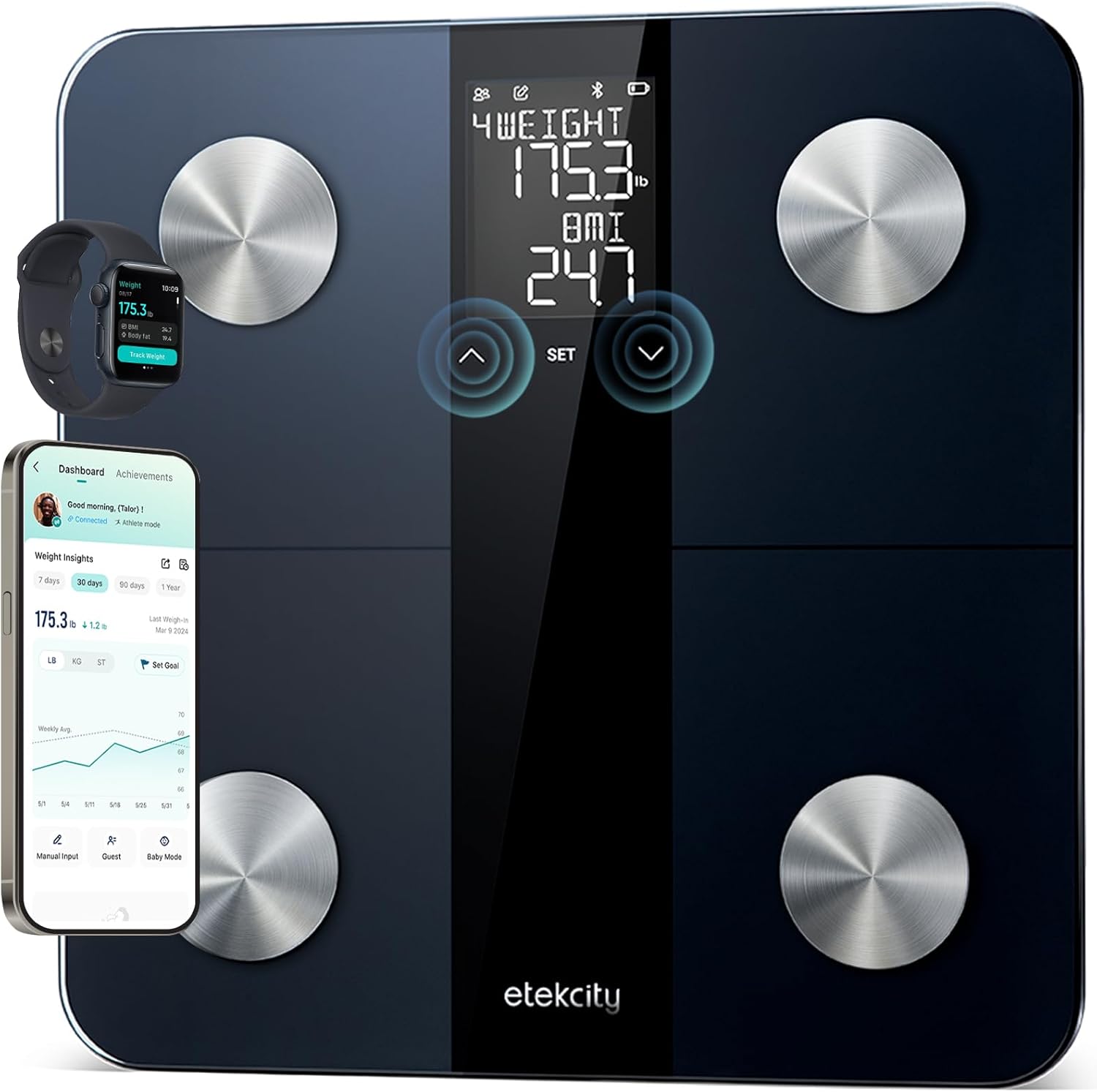Here’s an overview of the Best Smart Scales that we’ll explore today:
Smart scales have evolved from simple weightometers to holistic body composition tools that integrate with health ecosystems. For fitness enthusiasts, dieters, and wellness-minded households, these devices provide actionable data—weight, fat percentage, muscle mass, hydration, and more—and can sync with apps to visualize trends over time. When evaluating scales, I consider accuracy (bioelectrical impedance consistency, electrode configuration), display readability, ease of use (automatic user recognition, calibration-free operation), platform support (Apple Health, Google Fit, Fitbit), data privacy, and how well the ecosystem supports long-term behavior change. The following review covers five models from three brands, spanning a price range from budget to premium, and includes practical testing notes, real-world use cases, and a clear set of pros and cons for each product.
1. Etekcity Smart Scale for Body Weight
- Brand: Etekcity
- Manufacturer: Etekcity
Overview: This model emphasizes a comprehensive 13-metric profile with VeSync integration and an upgrade-ready positioning. It offers an appealing entry point with a very affordable price and broad app support, including Apple Health, Google Fit, Samsung Health, and MyFitnessPal. The device highlights low 0.05 lb (0.02 kg) granularity and supports multiple modes (Zero-Current, Baby, Light Item) for versatility. The marketing emphasizes a decade-long track record and mass adoption across 30 countries, reinforcing perceived reliability at a budget price. Pros include strong app ecosystem, high measurement granularity, and flexible use modes. Cons include reliance on the VeSync platform for full feature parity and potential variability in accuracy across users if not placed correctly on the surface, as is common with BIA scales.
Performance-wise, the combination of dual-mode measurement and a large VeSync ecosystem can drive meaningful progress tracking for average users who want more than weight. The 13 metrics give a fuller picture (BMI, body fat, muscle mass, etc.), and the offline/low-friction modes reduce dependence on a phone during quick checks. However, as with most BIA scales, body composition readings are sensitive to hydration, time since last meal, and footwear/shoe contact. The Baby and Light Item modes are useful niche features for families with kids or pets, but for serious athletes who rely on precise body fat and lean mass trends, a dedicated DEXA or FDA-cleared monitor would be more accurate. Overall, it is best for entry-to-intermediate users who want a broad metric set without paying a premium.
Pros
- Very affordable for multi-metric data
- Free VeSync app with custom plans and workouts
- High measurement granularity (0.05 lb steps)
- Supports multiple user profiles and modes (Baby, Light Item)
- Compatible with major health ecosystems
Cons
- Biometric readings can be influenced by hydration and timing
- App-dependent experience; feature parity may vary with updates
- Not a premium-grade display or hardware sensor set
2. Etekcity Smart Scale for Body Weight Fat
- Brand: Etekcity
- Manufacturer: Etekcity
Overview: This model expands on the basic scale by advertising 14 metrics accessible via app and a TFT color display on the unit, with Wi-Fi connectivity for cloud syncing and Alexa voice control. It promotes a more dynamic user experience, including goal setting and data visualization across devices, and emphasizes privacy via VeSync data protection. Pros include the broad 14-metric suite visible on both app and TFT display, Wi‑Fi cloud sync, and hands-free Alexa integration. Cons include potential complexities with initial setup for cloud features and heavier reliance on the VeSync ecosystem for full functionality.
In practice, the large TFT display makes it easy to read metrics at a glance, while the cloud syncing allows progress to be tracked remotely. The scale supports up to 9 body metrics on the main display, which is helpful for quick checks without pulling out a phone. The Wi-Fi connection is convenient, but it can introduce an additional failure point if the network is unstable. For households already using VeSync-compatible devices, this scale offers a cohesive experience; for others, there may be a learning curve to unlock its full potential.
Pros
- 14 metrics via app; 9 metrics on display
- Wi-Fi cloud syncing for accessibility
- TFT display enhances readability
- Alexa voice control for hands-free querying
- Regular app-based progress insights
Cons
- Setup complexity with Wi‑Fi and cloud features
- Reliance on VeSync platform for full feature access
- Potentially slower response due to cloud sync
3. iHome Digital Bluetooth Smart Scale for Body Weight
- Brand: iHome
- Manufacturer: iHome
Overview: The iHome Bluetooth scale represents a budget-friendly option with 14 body composition metrics and included batteries. It emphasizes Bluetooth connectivity with Google Fit and Apple Health, plus auto shut-off and basal metabolic rate calculations. The scale is designed with durable tempered glass and a 397 lb weight limit, appealing to a broad user base. Pros include strong value at a low price, broad compatibility with major health apps, and a straightforward battery-included package. Cons include potentially less robust cloud features compared to Wi-Fi-enabled rivals and reliance on Bluetooth for real-time syncing.
Performance-wise, the 14 metrics plus BMR provide useful insights for everyday users who want a simple, reliable scale without extra features. The anti-slip tempered glass contributes to safer use in wet bathrooms. However, Bluetooth syncing means you’ll periodically sync manually if the app isn’t actively running, and the lack of a full-color display on-device (LED) may reduce on-scale readability in dim bathrooms. It’s a strong pick for users who prioritize cost-effective tracking and standard app integrations.
Pros
- Extremely affordable
- 14 metrics including BMR and body fat
- Bluetooth with Google Fit and Apple Health
- Durable tempered glass and high weight capacity
- Batteries included
Cons
- Bluetooth dependency; no Wi-Fi cloud sync
- On-device display is basic (LED)
- Limited on-device insights without app connection
4. Etekcity Upgraded Smart Scale for Body Weight
- Brand: Etekcity
- Manufacturer: Etekcity
Overview: This upgraded model emphasizes an offline mode and dual-frequency BIA with a large display, aiming to deliver accurate results on-device without always needing the app. It claims no calibration is required and supports local data storage alongside third-party app connectivity with Apple Health, Google Fit, Fitbit, and MyFitnessPal. The battery life claim of up to 416 days is notable for a device with multiple sensors. Pros include offline capability, calibration-free operation, and broad app compatibility with privacy-conscious transmission tech. Cons include potential discrepancy between offline results and cloud-synced metrics, and a slightly higher price point for a model that competes with budget options.
In practice, the ability to use the scale without a phone is a practical benefit for quick weigh-ins or during workouts where you don’t want to pull out an app. The dual-frequency BIA and 13 metrics provide a deeper body composition readout, and the local data storage helps families track progress without constant cloud reliance. Users should still be mindful that BIA readings vary with hydration and recent activity, so consistency in measurement conditions remains essential for meaningful trends.
Pros
- Offline mode for independent use
- Calibration-free, easy setup
- Large display and 13 metrics
- High battery life up to 416 days
- Strong app ecosystem compatibility
Cons
- Offline vs. online metric alignment can vary
- Slightly higher price than base models
- Some users may prefer cloud-based coaching features
5. GE Smart Scale for Body Weight: 8-Electrode Digital Bathroom Scale for Weight Fat BMI Muscle Mass Full Body Composition Analyzer 27 Measurements Bluetooth Highly Accurate Weighing Machine
- Brand: GE
- Manufacturer: GE
Overview: The GE scale is positioned as a premium option with 8-electrode dual-frequency segmental BIA, offering 27 body composition metrics and a large, multi-profile-capable platform. It includes a Fit Profile app with data sharing and broad compatibility with Apple Health, Google Fit, and Fitbit. The on-display metrics (weight, BMI, body fat, body water, muscle mass, bone mass, visceral fat) provide quick snapshots, while the unlimited user support and up to 9 profiles suit families or groups. Pros include highly detailed metrics, robust app ecosystem, and strong data visualization. Cons include the premium price, potential calibration nuances, and a reliance on app usage for full insights beyond the on-scale display.
Performance-wise, the segmental 5-region analysis (limbs and torso) via 8-electrode BIA should yield more precise body composition estimates than simpler 4-electrode layouts, especially for tracking changes over time in athletes or weight-management programs. The 7 metrics shown on the LED display offer a quick readout without opening the app. Given its price point, it’s best suited for users who want deep analytics and seamless sharing with a family or gym cohort, rather than casual users seeking basic weight tracking.
Pros
- 27 metrics with segmental analysis
- HD LED display for quick reads
- Unlimited users and 9 profiles
- Strong ecosystem with data sharing
- App compatibility with Health apps
Cons
- Premium price point
- Calibration nuances can occur if not reset properly
- Reliance on app for full insights
Frequently Asked Questions
We’ve compiled answers to the most common questions about smart scaless to help you make an informed decision.
Conclusion
Final thoughts: If you value comprehensive analytics and family sharing, the GE model is the standout premium choice.
For those who want a broad metric set with strong app support at a more moderate price, the second Etekcity option offers the best balance.
The iHome model delivers exceptional value and straightforward connectivity for budget-minded buyers. The Etekcity scales with offline mode provide practical convenience for standalone use, while the basic first model remains a solid low-cost entry into health-tracking ecosystems..




